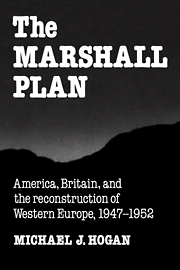Book contents
- Frontmatter
- Contents
- Editors' preface
- Preface
- Introduction: Toward the Marshall Plan: from New Era designs to New Deal synthesis
- 1 Searching for a “creative peace”: European integration and the origins of the Marshall Plan
- 2 Paths to plenty: European recovery planning and the American policy compromise
- 3 European union or middle kingdom: Anglo–American formulations, the German problem, and the organizational dimension of the ERP
- 4 Strategies of transnationalism: the ECA and the politics of peace and productivity
- 5 Changing course: European integration and the traders triumphant
- 6 Two worlds or three: the sterling crisis, the dollar gap, and the integration of Western Europe
- 7 Between union and unity: European integration and the sterling–dollar dualism
- 8 Holding the line: the ECA's efforts to reconcile recovery and rearmament
- 9 Guns and butter: politics and diplomacy at the end of the Marshall Plan
- Conclusion: America made the European way
- Bibliography
- Index
3 - European union or middle kingdom: Anglo–American formulations, the German problem, and the organizational dimension of the ERP
Published online by Cambridge University Press: 31 October 2009
- Frontmatter
- Contents
- Editors' preface
- Preface
- Introduction: Toward the Marshall Plan: from New Era designs to New Deal synthesis
- 1 Searching for a “creative peace”: European integration and the origins of the Marshall Plan
- 2 Paths to plenty: European recovery planning and the American policy compromise
- 3 European union or middle kingdom: Anglo–American formulations, the German problem, and the organizational dimension of the ERP
- 4 Strategies of transnationalism: the ECA and the politics of peace and productivity
- 5 Changing course: European integration and the traders triumphant
- 6 Two worlds or three: the sterling crisis, the dollar gap, and the integration of Western Europe
- 7 Between union and unity: European integration and the sterling–dollar dualism
- 8 Holding the line: the ECA's efforts to reconcile recovery and rearmament
- 9 Guns and butter: politics and diplomacy at the end of the Marshall Plan
- Conclusion: America made the European way
- Bibliography
- Index
Summary
In the spring of 1948, American officials began framing the Foreign Assistance Act and working with their European partners to implement the cooperative commitments outlined in the preliminary report of the CEEC. Although the forum now widened to encompass congressional and private leaders, including critics on the Left and the Right, most of those involved were able to maintain the earlier consensus on fundamental points. Much of the discussion involved the traders' and planners' approaches, with policymakers still viewing a combination of these as the key to an integrated European order that dovetailed with the strategic and economic goals of the United States. In theory, integration would create a framework large enough to reconcile Franco–German differences in the West, contain Soviet power in the East, and achieve bipolar equilibrium. It would also enhance productivity in Western Europe, as it had done in the United States, without the arbitrary government controls that threatened private enterprise. The commitment to greater productivity was another component of the New Deal synthesis – a neo-capitalist formulation that also included Keynesian economic strategies and new patterns of public–private cooperation and power sharing.
This formulation, as well as balance-of-power considerations, inspired the defense of the Marshall Plan in Congress and guided American policy in Europe. But because it cut across national interests and more conventional categories of economic thought, it also became the subject of considerable controversy on both sides of the Atlantic.
- Type
- Chapter
- Information
- The Marshall PlanAmerica, Britain and the Reconstruction of Western Europe, 1947–1952, pp. 88 - 134Publisher: Cambridge University PressPrint publication year: 1987



